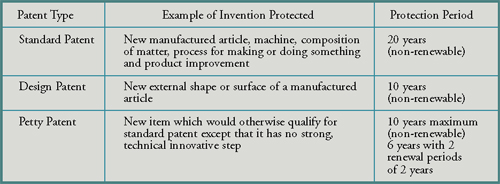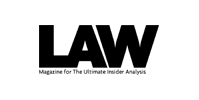| |
One of the most difficult issues for foreign investors doing business in developing countries such as Thailand is how best to protect their proprietary technology from infringement.
This issue can be particularly huge, as many times, the company’s technology to be protected will be among its most valuable assets and the basis of its competitive advantage in the market.
Patents are the primary (but not the only) device by which parties identify and protect their proprietary ownership of an invention.
A somewhat simplistic definition of a patent is a temporary, exclusive right granted to an inventor (individual or business) by the government to prevent others from manufacturing, selling or using the invention.
Note that the definition of “invention” here is quite broad and encompasses all patentable technology including mechanical inventions, processes, formulas and designs.
This article will explain:
The general objectives of patent law
The benefits associated with registering patents in Thailand.
Objectives of Patent Law
One of the primary objectives of patent law is to promote innovation in the market place. It works to accomplish this by granting the developers of patentable inventions an incentive in the form of an exclusive right to use, produce and sell the invention for a period of time.
Patent law is so important because without such protection, unauthorized parties would be free to wait for others to invest the time, energy and money necessary to develop new technology and then simply copy it. Therefore, patent protection helps to facilitate a return on investment.
EXAMPLE: Suppose a company expends the time, money and effort necessary to develop an innovative and potentially life saving surgical device. The company eventually applies for and obtains a patent for the product. That company would be granted an exclusive right to produce, use and sell that invention for a set period of time.
During the protection period a third party with no rights to the invention begins to produce, use and sell the device. The patent holder may then call on a court and/or the police (see Chapter 6) to order the infringer to cease production use, and/or sale of the device and impose fines and/or imprisonment.
Another objective of patent law is to provide greater certainty in the market by providing a system by which to determine who holds the exclusive rights to a particular invention.
EXAMPLE: Suppose Company A and Company B are competitors in Thailand and are both racing to develop the same patentable technology. Company A files a patent for the technology before Company B and the patent is eventually granted. Here, as Thai law generally states that the first party to file a patent application (which is eventually approved) has exclusive rights to the invention, it would be clear that Company A has the exclusive rights to the technology rather than Company B.
Benefits of Registration
There are many benefits to registering patents in Thailand. The four discussed below are associated with protecting patents against would be infringing third parties in Thailand.
1. Protection Periods
There are three types of patents in Thailand each with differing protection periods. They are as follows.

2. Scope of Protection
Once a patent application has been filed and subsequently published the technology contained in the application becomes a part of the ‘state of the art’. This means that future inventions based on the same technology or innovation would no longer be patentable.
EXAMPLE: An individual files a patent application in Thailand for a new and innovative type of can opener and the application is filed, published and then eventually approved.
At the time of publication, this invention would become a part of the state of the art which means that any subsequent patent applications based upon the exact same invention would not be considered new and, therefore, not patentable.
3. Increased Penalties
In order to claim exclusive ownership of an invention in Thailand the owner (or someone authorized by the owner) must obtain a patent in Thailand. As the chart below shows, Thai law does not afford protection to invention owners who have not filed for and obtained a patent in Thailand.

EXAMPLE: Suppose a Japanese car company develops a completely new automobile transmission system for a line of cars to be sold in Thailand. A local, unaffiliated parts company in Thailand then starts to produce and sell the transmission system using the same technology.
If the Japanese company has not registered a patent for the transmission system with the Intellectual Property (DIP) in Thailand, no penalties would be applicable to the local, unaffiliated company.
If the Japanese company has already registered its patent with the Thailand DIP, however, the maximum fine applicable to an infringing party for production and sale would be 800,000 baht (400,000 baht fine x 2 infractions = 800,000 baht) and/or 2 years imprisonment (2 years imprisonment x 2 infractions = 4 years) maximum imprisonment. Moreover, the presiding Thai court can order the infringer to stop the production and sale of the transmission system.
Note that even though terms of imprisonment are technically applicable to patent infringers under Thai law, in actual practice Thai courts in the past have been generally reluctant to impose a sentence of imprisonment on infringers in these situations.
4. Priority
The concept of ‘granting priority’ means that the owner of an invention is granted patent protection as of the date the patent in Thailand was applied for (but not yet approved) as long as the patent application is eventually approved.
EXAMPLE: A US company operating in Thailand develops a new technology to use agricultural by products to produce a biodegradable plastic. The company files a patent application for the technology in Year One and the application is eventually granted approval in Year Five. In this case because the application was eventually granted approval, the US company would receive patent protection for the technology as of the time the original application was filed in Thailand (Year One) instead of when the application was finally approved (Year Five).
The concept of granting priority also extends to patents first filed overseas then subsequently filed in Thailand.
Under Thai law, if an application for a Standard Patent is filed in one country and then is subsequently filed in Thailand within 12 months of the initial filing, the owner can claim priority and receive protection in Thailand as of the date of the initial filing in the other country (as long as the country of the first filing grants similar rights to Thailand parties). For Petty and Design Patent applications, the priority period is six months.
EXAMPLE: A German manufacturing company files a Standard Patent application in Germany on January 1st for a new manufacturing process. The patent had not previously been registered anywhere in the world. On December 1st of the same year, the company files the patent application in Thailand. Both applications are eventually approved. Generally, because both Germany and Thailand are members of the WTO and the Thailand application was filed within one year of the initial German application, the owner can claim protection of the patent in Thailand as of January 1st (filing date in Germany) instead of as of December 1st (date of filing in Thailand).
Note that in order for the German applicant to receive the benefit of priority in Thailand it must indicate the priority date in the blank provided in the Thailand application. • |
|



|
|













